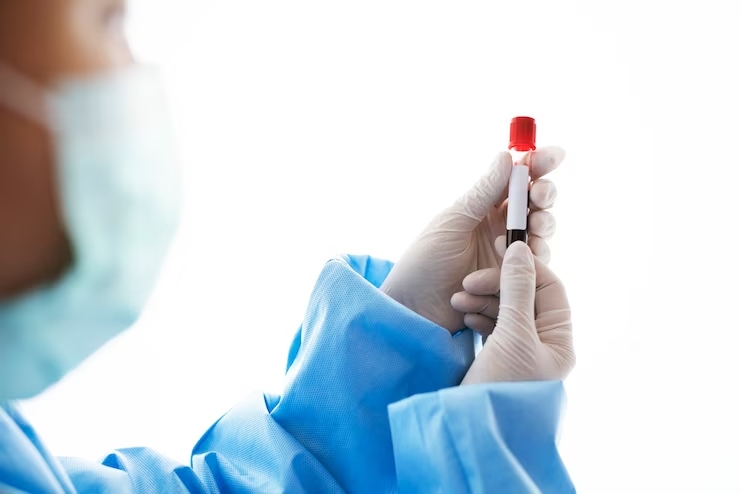Preventive Healthcare
RPR Test (Rapid Plasma Reagin Test): Procedure, Uses, Risks & Results
16223 Views
0

RPR test or rapid plasma reagin test is a blood test used to screen for syphilis. Syphilis is a sexually transmitted disease caused by treponema pallidum. After the infection, the host forms non-treponemal antibodies called reagins. RPR carbon antigen test is a macroscopic, nontreponemal flocculation test for the detection and semiquantitative estimation of reagin antibodies.
Why is The RPR Test Useful?
This test is used to screen and treat syphilis. The RPR test measures antibodies in a person's blood rather than the bacterium that causes the infection.
Your physician may recommend this test if you have syphilis-like sores or a rash. The test is also used to see how the treatment for syphilis is working.
After a course of effective antibiotic therapy, your doctor would expect the number of antibodies to decrease, and an RPR test might confirm this. So if you are a sexually active adult with HIV or AIDS, you may need the RPR test at least once a year.
Doctors often use an RPR test to check pregnant women for syphilis. States used it to demand a syphilis screening test for anyone applying for a marriage certificate.
Why Do You Need This Test?
You may need this test if you are sexually active and have symptoms of syphilis. The symptoms may include:
- A small painless sore where syphilis invaded your body
- Skin rash
- Fever
- Swollen lymph glands
- Hair loss
- Headaches
- Weight loss
In the later stages, symptoms include loss of sensation, paralysis, blindness, dementia, and death.
Procedure of RPR Test
RPR test is performed in the same manner as any other simple blood test.
- A lab technician will tie a rubber tube around the person's upper arm. This encourages blood to pool in the vein, thereby making it easier for the technician or doctor to locate the vein.
- Swab the region with antiseptic and use a needle to take a small sample of blood once they have located a suitable vein.
- When the needle is removed, the technician will apply pressure to the location before applying an adhesive bandage to the arm.
- They then submit the sample to a lab for examination.
Results of RTR Test
In an RPR blood sample, if no antibodies are detected, your doctor cannot rule out syphilis.
It takes time for your immune system to produce antibodies once infected. A test may not show any antibodies shortly after infection. This is known as a false -ive result.
False negatives are more common in the early and late phases of infection. The RPR test is nearly always +ive in persons in the middle stage of infection.
The RPR test can also generate false-positive findings, showing that you have syphilis when you don't. The prevalence of another disease that produces antibodies comparable to those produced during a syphilis infection is one cause of a false +ive.
Among the factors that can result in a false +ive are the following:
- Lyme disease
- HIV
- Malaria
- Lupus
- Certain kinds of pneumonia, particularly those associated with a weakened immune system
If your test results are -ive, your doctor may advise you to wait a few weeks before repeating the test if you are at a higher risk for syphilis. This is due to the RPR test’s potential for a false -ive.
Because of the risk of false +ive results, your doctor will verify syphilis with a 2nd test. This test looks for antibodies to the bacterium that cause syphilis before starting the treatment.
Interpretation of the RPR Test Results
- Reactive: Large and medium black floccules against a white background.
- Weakly reactive: Small black flock against a white background.
- Non-reactive: No floccules; an even grey background.
The reactive result indicates the presence of reagin or antipodal antibodies.
A non-reactive result indicates an absence of reagent or anti-lipoidal antibodies.
Key Takeaways
- A negative or non-reactive result means you are not likely to have syphilis.
- Shortly after infection, a test may not yet show any antibodies. This is known as a false negative.
- Positive results are given as a ratio in titters.
- If the screening test is positive, the next step is to confirm the diagnosis with a more specific test, such as FTA-ABS.
Risks of RPR Test
Venipuncture is a minimally invasive procedure with few risks. Following the test, some people report discomfort, bleeding, or bruising. To alleviate these symptoms, apply an ice pack to the puncture hole.
During the test, some people may feel dizzy or light-headed. Inform your doctor if your dizziness lasts more than a few minutes.
Related Tests
These are the related tests performed to screen for syphilis.
- VDRL (Venereal Disease Research Laboratory) Test: This screening test looks for syphilis antibodies in your blood or spinal fluid. The VDRL Test, like RPR tests, can be inaccurate.
- Rapid Immunochromatographic Test. This screening test also looks for antibodies to syphilis. A blood sample can be collected and evaluated during a routine doctor's appointment.
The following tests are used to confirm a syphilis infection:
- Enzyme Immunoassay (EIA) Test: This test is frequently used in conjunction with an RPR or VDRL test.
- Fluorescent Treponemal Antibody Absorption (FTA-ABS) Test: This test detects antibodies after 3 to 4 weeks of infection.
- Treponema Pallidum Particle Agglutination Assay (TPPA): This test detects antibodies and is frequently used in combination with an initial screening.
- Darkfield Microscopy: This test uses a microscope to examine a syphilis germ in a sample of fluid or tissue. It is most commonly utilised in the early stages.
- Microhemagglutination Assay (MHA-TP): This test is frequently performed after a positive result from another test.
Conclusion
Syphilis is a treatable infection, and a person can usually expect to recover completely with treatment. However, if syphilis is not treated, it can lead to serious consequences. When suffering from signs of syphilis infection, it is critical to consult a doctor about the RPR test.
If your RPR and FTA-ABS tests show symptoms of syphilis, your doctor will start an antibiotic therapy; usually, penicillin is injected into the muscle.
 Home Visit
Home Visit Upload
Upload














1701259759.webp)









 WhatsApp
WhatsApp